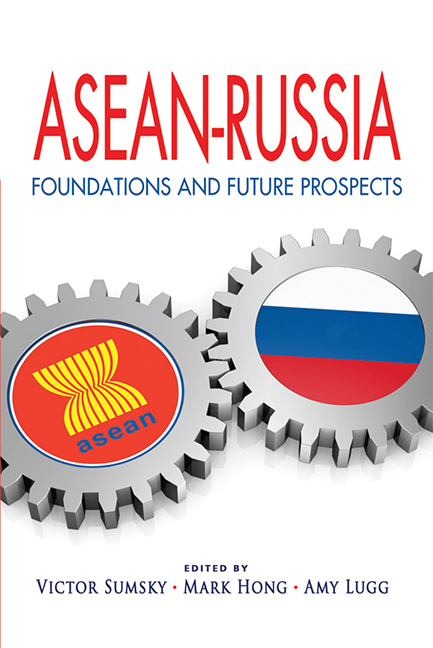Book contents
- Frontmatter
- Contents
- Foreword
- Preface
- About the Contributors
- Keynote Address
- Opening Remarks
- Keynote Address
- Introduction: Russia and the ASEAN Member States: Political and Economic Cooperation in Progress
- SECTION I WISEMEN'S VIEWS
- SECTION II GEOPOLITICS
- SECTION III BILATERAL RELATIONS
- SECTION IV Business and Economics
- SECTION V CULTURE AND EDUCATION
- EPILOGUE
- Index
Preface
Published online by Cambridge University Press: 21 October 2015
- Frontmatter
- Contents
- Foreword
- Preface
- About the Contributors
- Keynote Address
- Opening Remarks
- Keynote Address
- Introduction: Russia and the ASEAN Member States: Political and Economic Cooperation in Progress
- SECTION I WISEMEN'S VIEWS
- SECTION II GEOPOLITICS
- SECTION III BILATERAL RELATIONS
- SECTION IV Business and Economics
- SECTION V CULTURE AND EDUCATION
- EPILOGUE
- Index
Summary
This project — both the book and the conference that preceded it — is dedicated to the 15th Anniversary of the Russia-ASEAN dialogue partnership celebrated in 2011. In moments like these, it is natural to dwell on the past, to register what is happening at present and to look into the future. The title of this volume may not sound too original, but, nonetheless, it is a reflection of these basic attitudes.
Just like in some previous joint ventures of the type, the ASEAN input is mobilized and coordinated through ISEAS, the body with a rich institutional memory, focused for almost half a century on all sorts of Southeast Asian studies, be it linguistics and ancient history or modern regionalism and recent manifestations of globalization. Compared to ISEAS, the present coordinator on the Russian side — the ASEAN Centre that was opened in MGIMO-University of Moscow in June 2010 — is still an infant. The April conference was practically its debut on the regional academic scene. Judging by the positive feedback we received (and, I hope, by the contents of this book) the start is not so bad.
As you may see, this time the Russian writing and speaking team is bigger and more diverse in terms of professional interests and research specializations than in any of the previous encounters with ISEAS. On the list of Russian participants, you will find political scientists and economists, experts on particular countries or groups of countries and those who are dealing with ASEAN as a whole, university professors and business consultants, representatives of the government and civil society groups. The fact that each of them has something to say about Russia-ASEAN relations is an indication that, little by little, the fabric of these relations is becoming thicker and stronger, and they are no longer limited, like in the Soviet era, to intergovernmental contacts.
Of the people, who should have been engaged in this project, but missed it due to some unhappy circumstances, I cannot help but mention Professor Gennady Chufrin. On our side, he was the driving force of the previous ISEAS-IMEMO projects on Russia-ASEAN relations, and we will be glad to have him back as a key participant and an inspiration for future events and publications.
- Type
- Chapter
- Information
- ASEAN-RussiaFoundations and Future Prospects, pp. xi - xiiPublisher: ISEAS–Yusof Ishak InstitutePrint publication year: 2012

